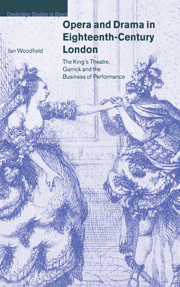 Opera and Drama in Eighteenth-Century London
Opera and Drama in Eighteenth-Century London Published online by Cambridge University Press: 22 September 2009
The prosperity and high reputation of the English community in Rome would have been hard to predict when diplomatic relations between London and the Vatican were severed after the defeat of James II by William of Orange. For many decades, the Pope's support for the Jacobite cause made Rome an uncomfortable place for aristocratic English visitors. But the influence of the Jacobites began to wane, and by the mid century Rome had become one of the most important destinations on the Grand Tour. Thomas Jones reported that Romans arranged their English visitors in three classes: ‘Artisti’, who came for ‘Study and Improvement’; ‘Mezzi Cavalieri’, ‘who lived genteely, independent of any profession’; and ‘Cavalieri’ or ‘Milordi Inglesi’,who moved in a ‘Circle of Superior Splendour surrounded by a group of Satellites under the denomination of Travelling Tutors, Antiquarians, Dealers in Virtu, English Grooms, French Valets and Italian running footmen’. ‘To be a native of Great Britain’, Kelly wrote of his experiences in Italy in the late 1770s, ‘was a passe-partout’ all over the country.’ With no formal representation as yet at the Vatican, the large English community relied on a leading banker, Thomas Jenkins, who functioned in effect as an unofficial ambassador. As James Northcote pointed out in 1778, Jenkins was ‘of vast use to all the English, who fly to him as they would an Ambassador, for the King sends none to the Pope’.
To save this book to your Kindle, first ensure [email protected] is added to your Approved Personal Document E-mail List under your Personal Document Settings on the Manage Your Content and Devices page of your Amazon account. Then enter the ‘name’ part of your Kindle email address below. Find out more about saving to your Kindle.
Note you can select to save to either the @free.kindle.com or @kindle.com variations. ‘@free.kindle.com’ emails are free but can only be saved to your device when it is connected to wi-fi. ‘@kindle.com’ emails can be delivered even when you are not connected to wi-fi, but note that service fees apply.
Find out more about the Kindle Personal Document Service.
To save content items to your account, please confirm that you agree to abide by our usage policies. If this is the first time you use this feature, you will be asked to authorise Cambridge Core to connect with your account. Find out more about saving content to Dropbox.
To save content items to your account, please confirm that you agree to abide by our usage policies. If this is the first time you use this feature, you will be asked to authorise Cambridge Core to connect with your account. Find out more about saving content to Google Drive.